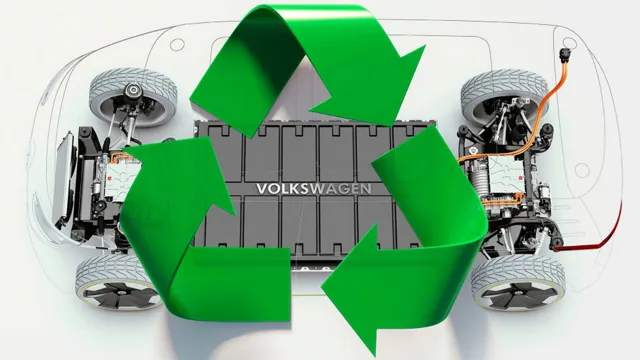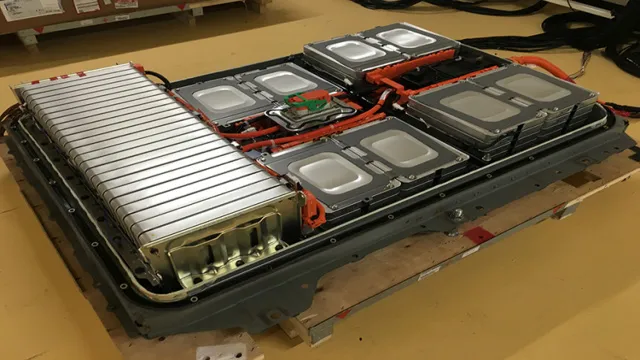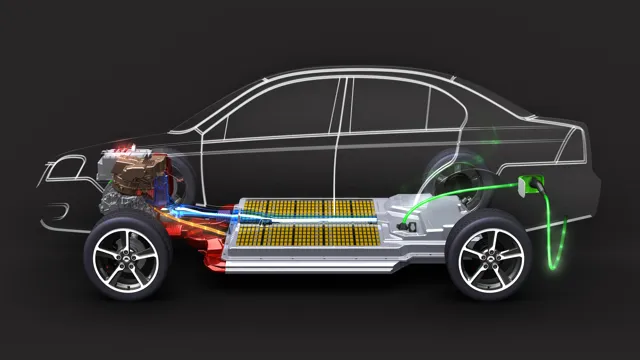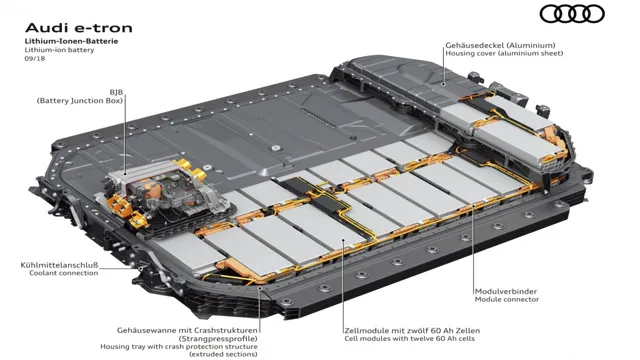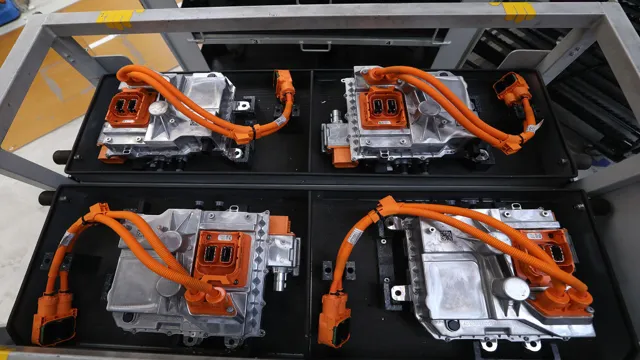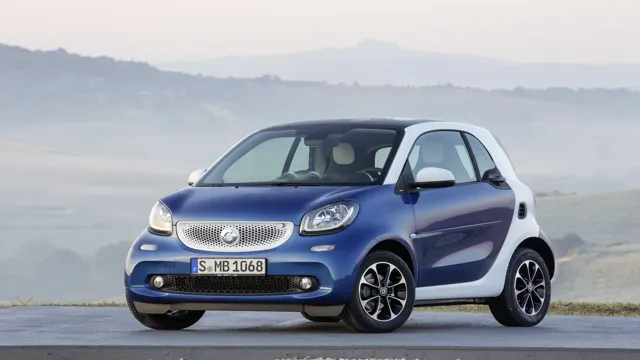Transforming Waste into Power: The Thrilling Potential of Electric Car Battery Reuse
Electric cars are becoming increasingly popular as society pushes for more sustainable transportation options. However, one major concern that many people have with electric cars is the idea of battery waste. Fortunately, there is a solution that is gaining traction in the industry: electric car battery reuse.
Rather than letting used electric car batteries go to waste, they can actually be repurposed and used for other purposes such as renewable energy storage. This not only helps to reduce waste, but it also provides an affordable solution for those looking to utilize renewable energy sources. Electric car battery reuse is also beneficial for the environment.
By repurposing these batteries, we can reduce the amount of new batteries that need to be manufactured, which can have a significant impact on our carbon footprint. Overall, electric car battery reuse is a promising solution for the future of sustainable transportation. By repurposing these batteries, we can reduce waste, promote renewable energy, and ultimately create a greener future for all.
Benefits of Reusing Electric Car Batteries
Electric car battery reuse offers numerous benefits for both the environment and consumers. One of the most significant advantages is reducing waste. Many electric cars have batteries that still have a high level of usable energy even after they can no longer meet the needs of the vehicle.
By reusing these batteries, it minimizes the environmental impact of disposing of them prematurely. Additionally, electric car battery reuse can provide cost savings for consumers. After the battery has completed its service in the vehicle, it can still be used for stationary energy storage applications in homes or businesses.
This gives consumers access to a reliable and cost-effective source of stored energy. Finally, electric car battery reuse can help to increase the overall sustainability of the electric vehicle industry. By extending the lifespan of electric car batteries, it can reduce the need for new batteries to be manufactured, therefore reducing the overall carbon footprint of the industry.
In summary, electric car battery reuse provides a win-win situation for both the environment and consumers.
Reduced Waste
Reduced Waste As the world moves towards greater sustainability, reusing electric car batteries has become an increasingly popular option. One of the main benefits of reusing these batteries is reducing waste. Rather than adding to the already overburdened landfills, reusing these batteries gives them a second life and reduces the need for new ones to be manufactured.
In addition to this, reusing batteries also reduces the demand for the minerals that are used to create new batteries, which can have a significant environmental impact on the areas where they are mined. Overall, reusing electric car batteries is a smart and sustainable option that not only helps reduce waste but also preserves the earth’s natural resources for future generations.
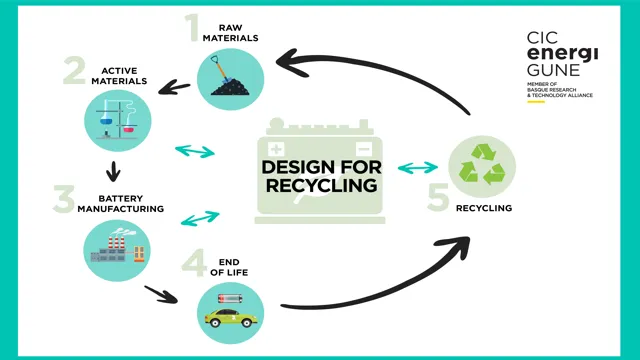
Cost Savings
One of the main benefits of reusing electric car batteries is that it can lead to significant cost savings. Rather than disposing of the batteries once they no longer serve a vehicle’s needs, they can be repurposed for other uses such as energy storage for homes or businesses. This reduces the need for new batteries and lowers overall costs.
Additionally, recycled batteries can be used to power other devices, such as electric bicycles or small household appliances, further extending their lifespan and value. By reusing electric car batteries, we can decrease waste and save money, making sustainable energy solutions more accessible for all.
Ways to Reuse Electric Car Batteries
Electric car battery reuse has been a hot topic in recent years, as automobile manufacturers work to create a more sustainable future. There are numerous ways that electric car batteries can be repurposed after their use in cars. One popular option is to use the batteries to power homes or businesses.
These batteries are capable of storing large amounts of energy, making them a great choice for backup power. Other uses include repurposing the batteries for use in electric bikes, scooters, and even boats. With their ability to store significant amounts of energy, electric car batteries have great potential for reuse, offering a more sustainable and environmentally-friendly option for energy storage.
By finding innovative and creative ways to repurpose these batteries, we can help reduce waste and contribute to a cleaner, more sustainable future.
Energy Storage Systems
Electric car batteries can still be useful even after they have reached the end of their lifespan. One way to reuse these batteries is by repurposing them for energy storage systems. The batteries can be integrated into the power grid and used for energy storage during periods of high demand, providing additional power during peak hours.
This can help to reduce the strain on the power grid, improve reliability, and reduce the reliance on fossil fuels. Another way to reuse electric car batteries is by converting them into stationary storage systems for homes or businesses. These systems can be used to store excess energy generated by solar or wind power systems, providing a reliable source of backup power during blackouts or power outages.
Overall, reusing electric car batteries for energy storage is a great way to reduce waste and promote sustainability, while also helping to build a more resilient and reliable energy infrastructure.
Off-Grid Power
Off-grid power enthusiasts can breathe new life into electric car batteries by reusing them. These batteries are often replaced in electric vehicles after a few years of use, but they still have a significant amount of energy left to give. Repurposing these batteries for off-grid use is not only eco-friendly but also cost-efficient.
One popular way to reuse these batteries is by combining them to create a battery bank, which can store energy from renewable sources such as solar panels or wind turbines. This creates a reliable and sustainable source of power that can be used to run essential appliances and electronics during power outages or as a primary source of electricity. Another way to reuse these electric car batteries is by using them to power electric bikes or scooters, which offer a clean and efficient mode of transportation while reducing carbon emissions.
Overall, repurposing electric car batteries for off-grid power is a smart and sustainable solution that benefits both the environment and the wallet.
Emergency Backup Power
When it comes to emergency backup power, electric car batteries can provide a great solution. Rather than disposing of them, there are several ways to reuse electric car batteries. One option is to repurpose them as stationary energy storage systems.
By connecting multiple EV batteries together, they can store energy from solar panels or wind turbines and release it when needed. This can be especially useful in remote or off-grid areas where power outages are common. Another way to reuse EV batteries is to use them to power home appliances or electric tools.
With a little bit of DIY knowledge, it’s possible to build a battery pack that will power these appliances, reducing the need to rely on the grid. Overall, reusing electric car batteries has the potential to benefit both individuals and the environment, reducing waste and providing a reliable source of backup power.
Challenges with Reusing Electric Car Batteries
Electric car battery reuse is a promising solution to reduce the environmental impact of electric vehicles. However, there are several challenges to consider. One of the main issues is the lifespan of the batteries.
After several years of use, electric car batteries lose their capacity and efficiency. Reusing these batteries in other applications, such as grid storage or home energy systems, may not be optimal if the batteries are already degraded. Furthermore, different electric car manufacturers use different battery chemistries and designs, which could complicate the reuse process and limit the compatibility between batteries.
Additionally, there is also the issue of safety. Used batteries may contain hazardous materials that need to be managed properly to avoid any risks. Despite these challenges, the potential benefits of electric car battery reuse are significant, and with continued research and development, these obstacles can be overcome.
Degradation of Battery Cells
The degradation of battery cells is one of the major challenges with reusing electric car batteries. Over time, these batteries lose their ability to hold a charge, which reduces their performance and lifespan. The main reason behind this issue is the chemical reactions that take place within the battery cells.
As a battery is charged and discharged, its electrode materials can break down, leading to a loss of capacity and slower charging times. While some battery manufacturers have attempted to mitigate this degradation through better electrode designs and chemistries, it remains a significant obstacle to reusing electric car batteries. In addition to the technical challenges of battery degradation, there are also logistical challenges associated with collecting and recycling batteries from used electric vehicles.
The sheer volume of batteries that will need to be recycled in the coming years presents a significant challenge for the industry. Nonetheless, efforts are being made to overcome these challenges and create a more sustainable future through the reuse and recycling of electric car batteries.
Compatibility Issues
Electric car batteries have created a buzz in recent years as a possible solution to the world’s environmental problems. However, reusing these batteries can sometimes be problematic since they may not be compatible with other vehicles. Automakers tend to design their electric vehicles with specific battery sizes and configurations, and different models use different types of batteries altogether.
Therefore, using an electric car battery designed for one vehicle may not only lead to compatibility issues, but can also pose safety risks and affect the car’s performance. To overcome this, automakers are trying to standardize electric car batteries to make them more interchangeable, which could lead to reduced waste and costs. Nonetheless, finding solutions to compatibility issues remain one of the biggest challenges in reusing electric car batteries.
Future of Electric Car Battery Reuse
With electric cars becoming more popular, the issue of what to do with the batteries once they lose their efficiency is becoming more pressing. It’s estimated that by 2030, there will be over 11 million used electric vehicle batteries that will need to be disposed of or recycled. But what if there was a way to reuse these batteries? That’s where the future of electric car battery reuse comes in.
Companies are exploring ways to repurpose these batteries as energy storage units for homes and businesses. By giving these batteries a second life, we can reduce waste and decrease our dependence on fossil fuels. Additionally, this could create a new market for used batteries, generating revenue for companies and driving down the cost of electric cars.
The future of electric car battery reuse may not only be environmentally friendly, but economically beneficial as well.
Conclusion
In conclusion, the reuse of electric car batteries is not only practical but also environmentally conscious. By giving these batteries a second life, we are reducing waste and extending the useful life of valuable resources. Plus, it’s a win-win situation for both the consumer and the manufacturer – the consumer gets a cheaper alternative to a brand new battery and the manufacturer gets to reduce the cost of production.
So, when it comes to electric car batteries, let’s not just dispose of them when they’ve run out of juice – let’s get creative and find new ways to use them!”
FAQs
What is electric car battery reuse?
Electric car battery reuse refers to using retired electric vehicle batteries for other energy storage purposes.
How can electric car batteries be reused?
Retired or used electric car batteries can be repurposed for off-grid applications like home energy storage systems, backup power supplies or even as stationary energy storage for charging electric vehicles.
What are the benefits of electric car battery reuse?
Reusing electric car batteries conserves resources and reduces waste while creating new opportunities for the ever-growing electric vehicle market. This can also lower the cost of battery production and energy storage.
Are there any limitations to electric car battery reuse?
There are limitations to electric car battery reuse, such as the fact that retired batteries may have reduced capacity or efficiency. However, advancements in battery recycling and refurbishing technologies are continuing to expand the possibilities for battery life extension and repurposing.
